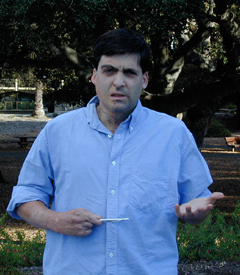PI with Diamond & Sparkcreative
"Mac vs. PC" videos
| See really | |
| So many mistakes | |
| I have experiments | |
| Supermen of the Mind | |
| My Planner |
|
| Duke Basketball | |
| Gifts | |
| The Dan Ariely Show |  |
Chapters at a glimpse
TESTIMONIALS
 |
“Predictably Irrational is wildly original. It shows why–much more often than we usually care to admit–humans make foolish, and sometimes disastrous, mistakes. Ariely not only gives us a great read; he also makes us much wiser.” George Akerlof, Nobel Laureate in Economics, 2001 Koshland Professor of Economics, University of California at Berkeley |
 |
“A marvelous book that is both thought provoking and highly entertaining, ranging from the power of placebos to the pleasures of Pepsi. Ariely unmasks the subtle but powerful tricks that our minds play on us, and shows us how we can prevent being fooled.” Jerome Groopman, Recanati Professor, Harvard Medical School and author of “How Doctors Think” |
 |
“Predictably Irrational is a charmer — filled with clever experiments, engaging ideas, and delightful anecdotes. Dan Ariely is a wise and amusing guide to the foibles, errors, and bloopers of everyday decision-making.” Daniel Gilbert, Professor of Psychology, Harvard University and author of “Stumbling on Happiness” |
 |
“Predictably Irrational is going to be the most influential, talked-about book in years. It is so full of dazzling insights — and so engaging — that once I started reading I couldn’t put it down.” Daniel McFadden, Nobel Laureate in Economics, 2000 Morris Cox Professor of Economics, University of California at Berkeley |
 |
Dan Ariely’s ingenious experiments explore deeply how our economic behavior is influenced by irrational forces and social norms. In a charmingly informal style that makes it accessible to a wide audience, Predictably Irrational provides a standing criticism to the explanatory power of rational egotistic choice.
Kenneth Arrow, Nobel Laureate in Economics 1972, Professor of Economics Stanford University. |
 |
A delightfully brilliant guide to our irrationality – and how to overcome it – in the marketplace and everyplace Geoffrey Moore, author of “Crossing the Chasm” and “Dealing with Darwin” |
 |
After reading this book, you will understand the decisions you make in an entirely new way.
Nicholas Negroponte, founder of MIT’s Media Lab and founder and chairman of the One Laptop per Child non-profit association. |
 |
This entertaining yet brilliant book helps us recognize the foibles that underlie the decisions we make in our life — large and small, profound and banal. More than just pointing our mistakes, Ariely helps us understand and appreciate the complex beauty of human nature. It’s nothing less than a witty survival manual for the early 21st century.
David A. Ross Director emeritus, San Francisco Museum of Modern Art and Director emeritus, Whitney Museum of American Art |
 |
A fascinating book, original in style and perspective. Every chapter presents different counter intuitive findings, and important insights that will leave you questioning a wide spectrum of beliefs about the decisions we all make. A fascinating and charming read, much like the author himself.
Dafna Ariely, Dan’s mother |
 |
Dan Ariely is a genius at understanding human behavior: no economist does a better job of uncovering and explaining the hidden reasons for the weird ways we act, in the marketplace and out. Predictably Irrational will reshape the way you see the world, and yourself, for good.
James Surowiecki, author of “The Wisdom of Crowds” |
 |
Dan brilliantly shatters common misperceptions in highly unusual ways that become permanently etched in your memory. Predictably Irrational will forever change how you think about such diverse subjects as product pricing, packaging, and online sex. It is a must read for anyone who wants to make better decisions in either their personal or professional life. We plan to buy copies for all of our clients. Of course, we expect to receive a family discount….
Yoram Ariely, Dan’s father |
 |
Predictably Irrational is a an engaging, insightful and funny book, with important lessons for the decisions we make every day. But, imagine how it feels to live with the author ….
Sumi Ariely, Dan’s wife |
 |
Predictably Irrational is a solidly scientific, eminently readable, and remarkably insightful look into why we do what we do every day … and why it’s so hard to change, even when we “know better.”
Wenda Harris Millard, President, Media, Martha Stewart Living Omnimedia |
 |
One of the best books this year, or any year. A towering contribution that helps us better understand how much un-thinking we do most of the time, and how to counteract it. Everyone who has to make decisions (and has to deal with decisions of others) must read this book.
Alan Kay, President of Viewpoints Research, winner of the Turing, Draper, and Kyoto Prizes |
 |
If you are interested in finding out why looking at things with a traditional mindset does not always provide meaningful or relevant insights…read this book.
Vince Barabba, Chairman, Kings County Ventures and Market Insight Corporation |
 |
Predictably Irrational will amuse you as it makes you wiser, and what you will learn about how you make choices will surprise you and may even change you. As a bonus, you will learn how much fun the scientific study of decision making can be.
Daniel Kahneman, Nobel Laureate in Economics, 2002 ugene Higgins Professor of Psychology and Public Affairs, Princeton University. |
 |
Predictably Irrational is an important book. Full of valuable and entertaining insights that will make an impact on your business, professional, and personal life.
Jack M Greenberg, Chairman, Western Union Company, retired Chairman and CEO McDonald’s Corporation |
 |
Predictably irrational is clever, playful,humorous, hard hitting, insightful, and consistently fun and exciting to read.
Paul Slovic, founder and President of Decision Research |
 |
The most difficult part of investing is managing your emotions. Dan explains why that is so challenging for all of us, and how recognizing your built-in biases can help you avoid common mistakes.
Charles Schwab, Chairman and Ceo, The Charles Schwab Corporation |
 |
Freakonomics held that people respond to incentives, perhaps in undesirable ways, but always rationally. Dan Ariely shows you how people are deeply irrational, and predictably so.
Chip Heath, Co-author Made to Stick, Professor Stanford Graduate School of Business |
 |
This is a killer book. Managers who want to really understand their customers (and themselves) must read “Predictably Irrational,” and make sure that everyone else in their organizations read it as well.
Chunka Mui, Fellow, Diamond Management and Technology Consultants, and co-author of Unleashing the Killer App. |
 |
Predictably Irrational is a fascinating book–I kept trying to stay away from it but couldn’t help myself. It’s the work of a social scientist, and the experiments described are balanced and brilliant, but the style and voice of the author is that of a story teller. This is a book about human nature itself–what a strange lot we are, and how lucky we are to have Dan Arielly among us.
Michael Ruhlman, Chef, journalist and author of, among other books, The Elements of Cooking: Translating the Chef’s Craft For Every Kitchen. |
| Back to Top | |
ORDER
EXCERPTS
Excerpted from Chapter 1 – The Truth About Relativity
Excerpted from Chapter 2 – The Fallacy of Supply and Demand
Excerpted from Chapter 4 – The Cost of Social Norms
Excerpted from Chapter 7 – The High Price of Ownership
[protected-iframe id=”4b32fb83882cf29a37e6c26505613a1b-1285065-114420722″ info=”http://www.predictablyirrational.com/mp3/disc4track3.m4a” width=”320″ height=”40″]
 |
 |
| This is me, thinking very hard about how to get this stick out of my shirt. Much like a lot of things in life, once you see the answer it seems trivial, but without this knowledge, it is surpassingly complex. | How would you ever know what works well and what does not, if you don’t experiment and try different things? |
 |
 |
|
Here I model a “pain and pleasure suit.” I designed it to measure how we combine pain (caused by extreme cold or hot temperature) in part of our body, and pleasure in another (note the cool photo effects) |
Sometimes you can recognize fantastic decisions the moment you stumble upon them. |
ACADEMIC PAPERS
Links to papers my collaborators and I have written over the years.
Uri Simonson, Niklas Karslsson, George Loewensein and Dan Ariely (2008) “The Tree of Experience In the Forest of Information: Overweighing Experienced Relative to Observed Information”. GAMES and Economic Behavior.
Kristina Shampanier, Nina Mazar and Dan Ariely (2007) “Zero as a Special Price: The True Value of Free Products”. Marketing Science. Vol. 26, No. 6, 742 – 757.
Paul W. Eastwick, Eli J. Finkel, Daniel Mochon, and Dan Ariely (2007) “Selective vs. Unselective Romantic Desire: Not All Reciprocity is Created Equal”. Psychological Science. Vol. 18, Nr. 4, 317 – 319.
Michael Norton, Jeana Frost and Dan Ariely (2007) “Less is More: The Lure of Ambiguity, or Why Familiarity Breeds Contempt”. Journal of Personality and Social Psychology. Vol. 92, 97-105.
On Amir and Dan Ariely (2007) “Decisions by Rules: The Case of Unwillingness to Pay for Beneficial Delays”. Journal of Marketing Research. Vol. XLIV, 142-152.
Leonard Lee, Shane Frederick and Dan Ariely (2006) “Try It, You’ll Like It: The Influence of Expectation, Consumption, and Revelation on Preferences for Beer”. Psychological Science. Vol. 17. (12) 1054-1058.
Steve Hoeffler, Dan Ariely, and Pat West (2006) “Path Dependent Preferences: The Role of Early Experience and Biased Search in Preference Development”. Organizational Behavior and Human Decision Processes. Vol. 101, No. 2: p. 215 – 229.
Michael Norton, Samuel Sommers, Evan Apfelbaum, Natassia Pura and Dan Ariely (2006) “Colorblindness and Political Correctness: Playing the Political Correctness Game”. Psychological Science. Psychological Science. 17(11), 949 – 953.
Nina Mazar and Dan Ariely (2006) “Dishonesty in Everyday Life and Its Policy Implications”. Journal of Public Policy and Marketing. Vol 25-1, 117-126.
Gal Zauberman, Kristin Diehl and Dan Ariely (2006) “Hedonic Versus Informational Evaluations: Task Dependent Preferences for Sequences of Outcomes”. Journal of Behavioral Decision Making. Vol 19-3, 191-211.
Leonard Lee and Dan Ariely (2006) “Shopping Goals, Goal Concreteness, and Conditional Promotions”. Journal of Consumer Research. Vol 33, 60-70.
Dan Ariely, George Loewenstein and Drazen Prelec. (2006) “Tom Sawyer and the Construction of Value.” Journal of Economic Behavior and Organization. Vol 60 1-10.
Dan Ariely and George Loewenstein (2006) “The Heat of the Moment: The Effect of Sexual Arousal on Sexual Decision Making”Journal of Behavioral Decision Making. 19 87-98.
Dan Ariely, Axel Ockenfels and Alvin Roth. (2005) “An Experimental Analysis of Ending Rules in Internet Auctions”. The RAND Journal of Economics. Winter (Volume 36-4), 890-907.
Baba Shiv, Ziv Carmon, Dan Ariely (2005) “Placebo Effects of Marketing Actions: Consumers May Get What They Pay For”. Journal of Marketing Research. 42 (4) 383-393.
Dan Ariely, Joel Huber, and Klaus Wertenbroch. (2005) “When Do Losses Loom Larger Than Gains?”. Journal of of Marketing Research. 42 (2) 134-138.
Michael Norton, Joan DiMicco, Ron Caneel, and Dan Ariely (2004) “AntiGroupWare and Second Messenger,” BT Technology Journal, 22 (4) 83-88.
James Heyman and Dan Ariely (2004) “Effort for Payment: A Tale of Two Markets,” Psychological Science, 15 (11) 787-793.—Featured as “Editor’s Choice” in Science (2004), 306, p. 199.
James Heyman, Yesim Orhun and Dan Ariely (2004) “Auction Fever: The Effect of Opponents and Quasi-Endowment on Product Valuations” Journal of Interactive Marketing, 18 (4). 4–21.
Jiwoong Shin and Dan Ariely (2004) “Keeping Doors Open: The Effect of Unavailability on Incentives to Keep Options Viable,” Management Science, 50 (5) 575 – 586.
Dan Ariely, John G. Lynch and Manny Aparicio (2004) “Learning by Collaborative and Individual-Based Recommendation Agents,” Journal of Consumer Psychology, 14 (1&2), 81- 94.
Dan Ariely and Gal Zauberman (2003) “Differential Partitioning of Extended Experiences,” Organizational Behavior and Human Decision Processes, No. 91, 128-139.
Dan Ariely, George Loewenstein and Drazen Prelec (2003) “Coherent Arbitrariness: Stable Demand Curves Without Stable Preferences,” Quarterly Journal of Economics, No.118 (1), (February), 73-105.
Dan Ariely and Itamar Simonson (2003) “Buying, Bidding, Playing, or Competing? Value Assessment and Decision Dynamics in Online Auctions,”
Journal of Consumer Psychology, No.13, 113-123.
Dan Ariely and Klaus Wertenbroch, Klaus (2002) “Procrastination, Deadlines, and Performance: Self-control by Precommitment,” Psychological Science, No. 13 (3), 219-224.
Joel Huber, Dan Ariely and Greg Fischer (2002) “Expressing Preferences in a Principal-Agent Task: A Comparison of Choice, Rating and Matching,” Organizational Behavior and Human Decision Processes, 87(1), 66-90.
Itzhak Aharon, Nancy Etcoff, Dan Ariely, Chris F. Chabris, Ethan O’Connor and, Hans C. Breiter (2001) “Beautiful Faces Have Variable Reward Value: FMRI and Behavioral evidence,” Neuron, 32, 537-551.
Dan Ariely and Dan Zakay (2001) “A Timely Account of the Role of Duration in Decision Making,” Acta Psychologica, 108 (2), 187-207.
Dan Ariely, (2001) “Seeing Sets: Representation by Statistical Properties,” Psychological Science, 12 (2), 157- 162.
Dan Ariely and George Loewenstein (2000) “When Does Duration Matter in Judgement and Decision Making?,” Journal of Experimental Psychology: General, 129 (4), 508-523.
Dan Ariely, Daniel Kahneman and George Loewenstein (2000) Joint commentary on “When Does Duration Matter in Judgement and Decision Making?,” Journal of Experimental Psychology: General, 129 (4), 524-529.
Dan Ariely (2000) “Controlling the Information Flow: Effects on Consumers’ Decision Making and Preference,” Journal of Consumer Research, 27(2), 233-248.
Dan Ariely and Jonathan Levav (2000) “Sequential Choice in Group Settings: Taking the Road Less Traveled and Less Enjoyed,” Journal of Consumer Research, 27 (3), 279-290.
Ziv Carmon and Dan Ariely (2000) “Focusing on the Forgone: How Value Can Appear So Different to Buyers and Sellers,” Journal of Consumer Research, 27 (3), 360-370.
Dan Ariely, Au Wing-Tung, Randy H. Bender, David V. Budescu, Christine B. Dietz, Hongbin Gu, Tom S. Wallsten and Gal Zauberman (2000) “The Effects of Averaging Subjective Probability Estimates Between and Within Judges,” Journal of Experimental Psychology: Applied, 6, 130-147.
Dan Ariely and Gal Zauberman (2000) “On the Making of an Experience: The Effects of Breaking and Combining Experiences on Their Overall Evaluation,” Journal of Behavioral Decision Making, 13, 219-232.
Dan Ariely and Ziv Carmon (2000) “Gestalt Characteristics of Experiences: The Defining Features of Summarized Events,” Journal of Behavioral Decision Making, 13, 191-201.
John G. Lynch and Dan Ariely (2000) “Wine Online: Search Costs Affect Competition on Price, Quality, and Distribution,” Marketing Science, 19 (1), 83-103.
Greg Fischer, Ziv Carmon, Dan Ariely and Gal Zauberman (1999) “Goal-Based Construction of Preferences: Task Goals and the Prominence Effect,” Management Science, 45 (8), 1057-1075.
Constantine Sedikides, Dan Ariely and Nils Olsen (1999) “Contextual and Procedural Determinants of Partner Selection: On Asymmetric Dominance and Prominence,” Social Cognition, 17, 118-139.
Steve Hoeffler and Dan Ariely (1999) “Constructing Stable Preferences: A Look Into Dimensions of Experience and Their Impact on Preference Stability,” Journal of Consumer Psychology, 8 (2), 113-139.
Christina Burbeck, Steve Pizer, Brian Morse Ariely, Dan, Gal Zauberman and Jannick P. Rolland (1996) “Linking Object Boundaries at Scale: A Common Mechanism for Size and Shape Judgments,” Vision Research, 36 (3), 361-372.
Jonathan A. Marshall, Christina Burbeck, Dan Ariely, Jannick P. Rolland and Kevin E. Martin and (1996) “Occlusion Edge Blur: A Cue to Relative Visual Depth,” Journal of the Optical Society of America: A, 13 (4), 681-688.
Reuven Dar, Dan Ariely and Hanan Frenk, (1995) “The Effect of Past-Injury on Pain Threshold and Tolerance,” Pain, 60, 189-193.
Dan Ariely and S. Tom Wallsten (1995) “Seeking Subjective Dominance in Multidimensional Space: An Explanation of the Asymmetric Dominance Effect,” Organizational Behavior and Human Decision Processes, 63 (3), 223-232.
Jannick P. Rolland, Dan Ariely and William Gibson (1994) “Towards Quantifying Depth and Size Perception in Virtual Environments,” Presence, 4, 24-49.
 Tweet
Tweet  Like
Like 











